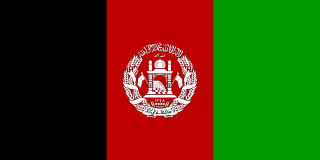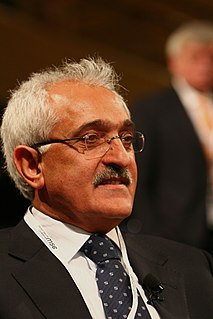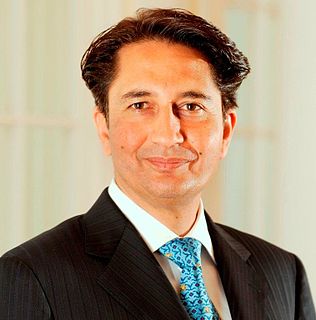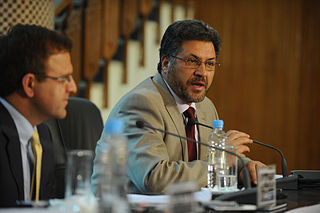Related Research Articles
The government of Afghanistan is currently disputed following the effective collapse of the Islamic Republic of Afghanistan during the fall of Kabul to Taliban forces on 15 August 2021 and the subsequent re-establishment of the Islamic Emirate of Afghanistan which now exercises de facto control over most of the country. On 7 September 2021 the Taliban officials in de facto control of most of Afghanistan announced a new interim government headed by Mullah Mohammad Hassan Akhund as Prime Minister. The government is subject to the oversight of the Taliban's Supreme Leader, Haibatullah Akhundzada. As of 8 September 2021, the Islamic Emirate of Afghanistan has not yet been formally recognized as the de jure government of Afghanistan by any other country. The representatives appointed by the Islamic Republic of Afghanistan continue to represent the country at the United Nations. These representatives have refused to recognize the Taliban appointed government and have urged other countries to not recognize this government either.
The Afghan Constitution Commission was established October 5, 2002 as required by the Bonn Agreement, which stipulated that a new Afghan constitution be adopted by a loya jirga. The loya jirga was required to convene within eighteen months of the establishment of Afghan Transitional Administration, which was established by the Emergency Loya Jirga in June 2002. After some delay, the proposed Afghan Constitution was presented to President Hamid Karzai on November 3, 2003. A loya jirga began December 14, 2003 in Kabul and was endorsed January 4, 2004.
Mohammad Yahya Maroofi, is an ethnic Pashtun from the Barakzai tribe. His family is from District Maroof Kandahar, Afghanistan.

The Transitional Islamic State of Afghanistan (TISA), also known as the Afghan Transitional Authority, was the name of a temporary administration of Afghanistan put in place by the loya jirga of June 2002. It succeeded the original Islamic State of Afghanistan and preceded the Islamic Republic of Afghanistan (2004–2021).
The Cabinet of Afghanistan consists of the ministers and deputy ministers of the government ministries of Afghanistan, as well as the prime minister and his deputies.

Dr. Rangin Dadfar Spanta is a politician in Afghanistan who last served as National Security Advisor of President Hamid Karzai. Prior to that he served as Foreign Minister from April 2006 to January 2010.

Said Tayeb Jawad is an Afghan politician and diplomat. He served as the last ambassador of the Islamic Republic of Afghanistan to the Russian Federation, from 2021 to 2022. From 2017 to 2020, Jawad served as Ambassador to the United Kingdom of Great Britain and Northern Ireland. From December 2003 to September 2010, Jawad served as Ambassador to the United States. He was also the non-resident Ambassador to Mexico, Brazil, Colombia and Argentina. From 2002 to 2003, he was Chief of Staff to President Hamid Karzai.

The Afghan Interim Administration (AIA), also known as the Afghan Interim Authority, was the first administration of Afghanistan after the fall of the Taliban regime and was the highest authority of the country from 22 December 2001 until 13 July 2002.

Mohammad Haneef Atmar is the former Minister of Foreign Affairs and a former Interior Minister of Afghanistan. He was removed from the Ministry of Interior Affairs by Hamid Karzai in the wake of attacks on the June 2010 Afghan Peace Jirga. Before that he worked with several international humanitarian organisations and served as Minister of Rural Rehabilitation and Development and Minister of Education. In 2011, he was part of the Right and Justice party. During his time in office, he has visited several countries to get funding to stabilise Afghanistan.

Abdullah Abdullah is an Afghan politician who led the High Council for National Reconciliation (HCNR), which was expected to lead the intra-Afghan peace talks with the Taliban, from 2020 to 2021. He served as Chief Executive of Afghanistan from September 2014 to March 2020 and as Minister of Foreign Affairs from December 2001 to April 2005. Prior to that he was a senior member of the Northern Alliance, working as an adviser to Ahmad Shah Massoud. He worked as an ophthalmologist and medical doctor in the 1980s.
Engineer Abdul Rahim was appointed the Afghan Communications Minister of the Afghan Interim Administration—the first post-Taliban government in 2002. Abdul Rahim was from the Tajik ethnic group.

Ghulam Farooq Wardak is a politician in Afghanistan, formerly serving as the Minister of Education. He was appointed to that position by Afghan President Hamid Karzai on October 11, 2008.

The Karzai administration was the government of Afghanistan under President Hamid Karzai, who became the head of state of Afghanistan in December 2001 after the Taliban government was overthrown. Karzai was appointed at the 2002 Loya Jirga as the Interim President of the Afghan Transitional Administration. After the 2004 Afghan presidential election, he became the President of Afghanistan.
The Afghan President Hamid Karzai announced the holding of a consultative grand council called the Afghanistan's National Consultative Peace Jirga (NCPJ) or shortly Peace Jirga in his inauguration speech on 19 November 2009, after winning elections for a second term, to end the ongoing Taliban insurgency. At the International Afghanistan Conference in London on 28 January 2010, he announced that the government would hold the event in April or May 2010, intended to bring together tribal elders, officials and local power brokers from around the country, to discuss peace and the end of the insurgency. "Jirga" is a word in the Pashto language that means "large assembly" or "council". It is a traditional method in parts of Afghanistan and Pakistan of resolving disputes between tribes or discussing problems affecting whole communities.

An emergency loya jirga was held in Kabul, Afghanistan between 11 and 19 June 2002 to elect a transitional administration. The loya jirga was called for by the Bonn Agreement and Bush administration. The agreement was drawn up in December 2001 in Germany. Conducted under United Nations auspices, the talks at Bonn sought a solution to the problem of government in Afghanistan after the US ousted the Taliban government.
The First Karzai cabinet lead the administration of Afghanistan between 2004, the year Hamid Karzai won the first Afghan presidential election and 2009 when the second presidential election took place. In 2006 there was a major cabinet reshuffle. The first Karzai cabinet followed the Afghan Transitional Administration which was put in place by the 2002 loya jirga. Karzai announced the names of the cabinet on 23 December 2004. The cabinet was sworn in on 24 December 2002 and held its first cabinet meeting on 27 December. This cabinet consisted of 27 ministers, including two women.

Zalmai Rassoul is an Afghan politician who served as Foreign Minister of Afghanistan from January 2010 to October 2013. He previously served as National Security Advisor from June 2002 to January 2010. Through his various roles in Government, Rassoul played a key role in building the Afghan security architecture, uniting the international community in support of an Afghan-led and Afghan-owned peace process, strengthening regional cooperation and security through the establishment of the Regional Economic Cooperation Conference on Afghanistan and the Heart of Asia-Istanbul Process, and rebuilding vital industries. He stood as a candidate in the 2014 presidential election.
The second Karzai cabinet was the cabinet of Afghanistan that led the government from the re-election of president Hamid Karzai in 2009 until the end of his term in 2014. The cabinet consisted of the president, his two vice-presidents, 18 ministers who received approval from the Afghan Parliament, and 7 acting ministers who have not been approved.

Sayed Ihsanuddin Taheri, or Sayed Ihsan Taheri, is an Afghan civil activist, politician and independent author, writer and blogger who was a 2012 World Vision International PeaceMaker Prize nominee. He is an official of the government of the Islamic Republic of Afghanistan, who has held various positions since 2002.
Mohammad Moeen Marastial is an Afghan politician who served as a Member of Parliament in Wolesi Jirga, the lower house, representing the people of Afghanistan from 2003 to 2009. During his incumbency, he advocated for education for all, a receptive and accountable government, focusing on the best interests of the nation and a strong rule of law.
References
- 1 2 "Qarqeen, Noor Mohammed". www.afghan-bios.info. Retrieved 2017-05-14.
- 1 2 Johnson, Thomas (August 2002). "Strategic Insight" (PDF). Archived (PDF) from the original on May 17, 2018.
{{cite journal}}: Cite journal requires|journal=(help) - ↑ "Turkey to open girls' high school in Kabul". Institute for War and Peace Reporting. Retrieved 2017-05-14.
- ↑ "Afghanistan Diplomatic Missions - Embassy of Afghanistan". www.afghanembassy.net. Retrieved 2017-05-14.